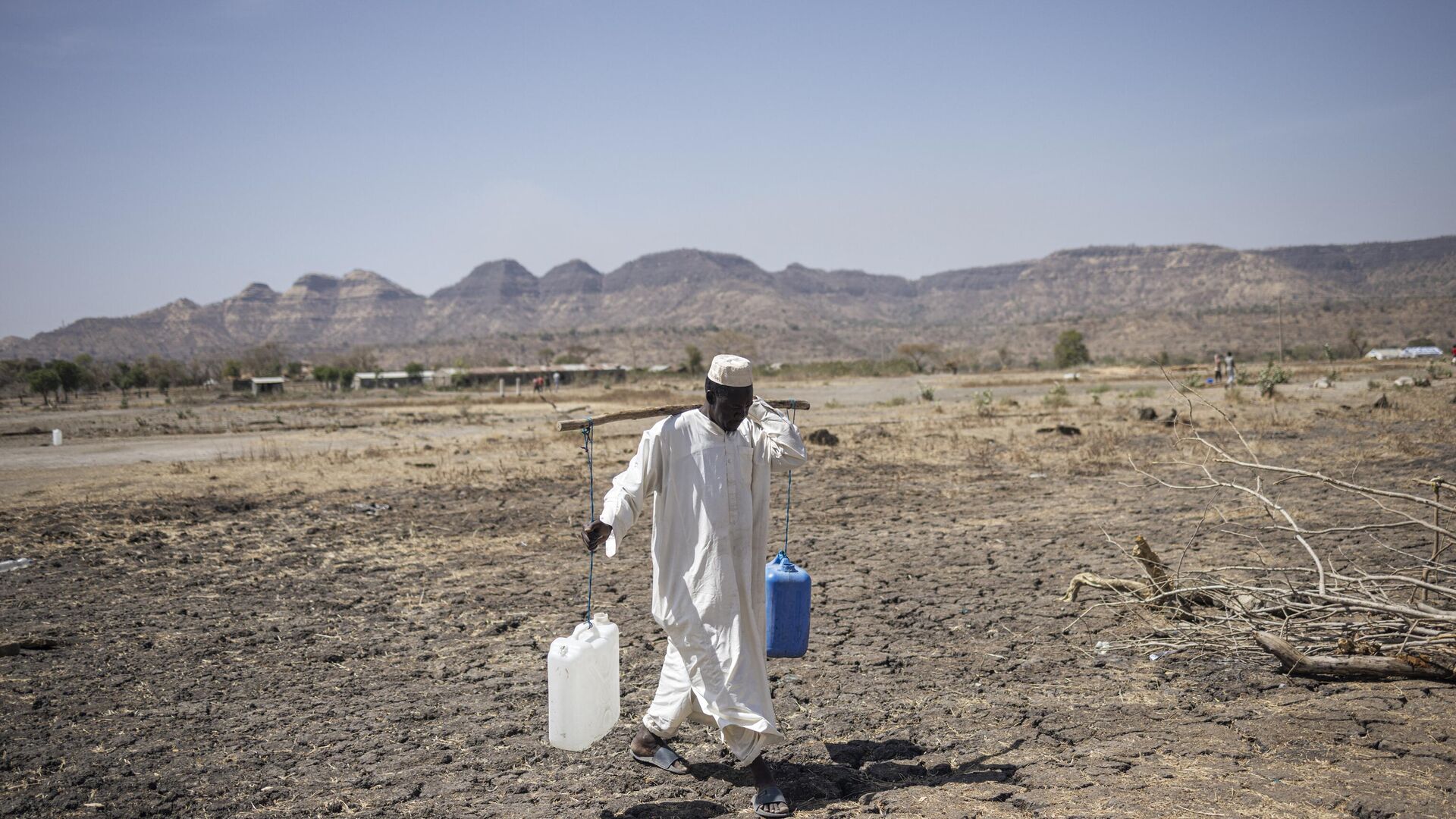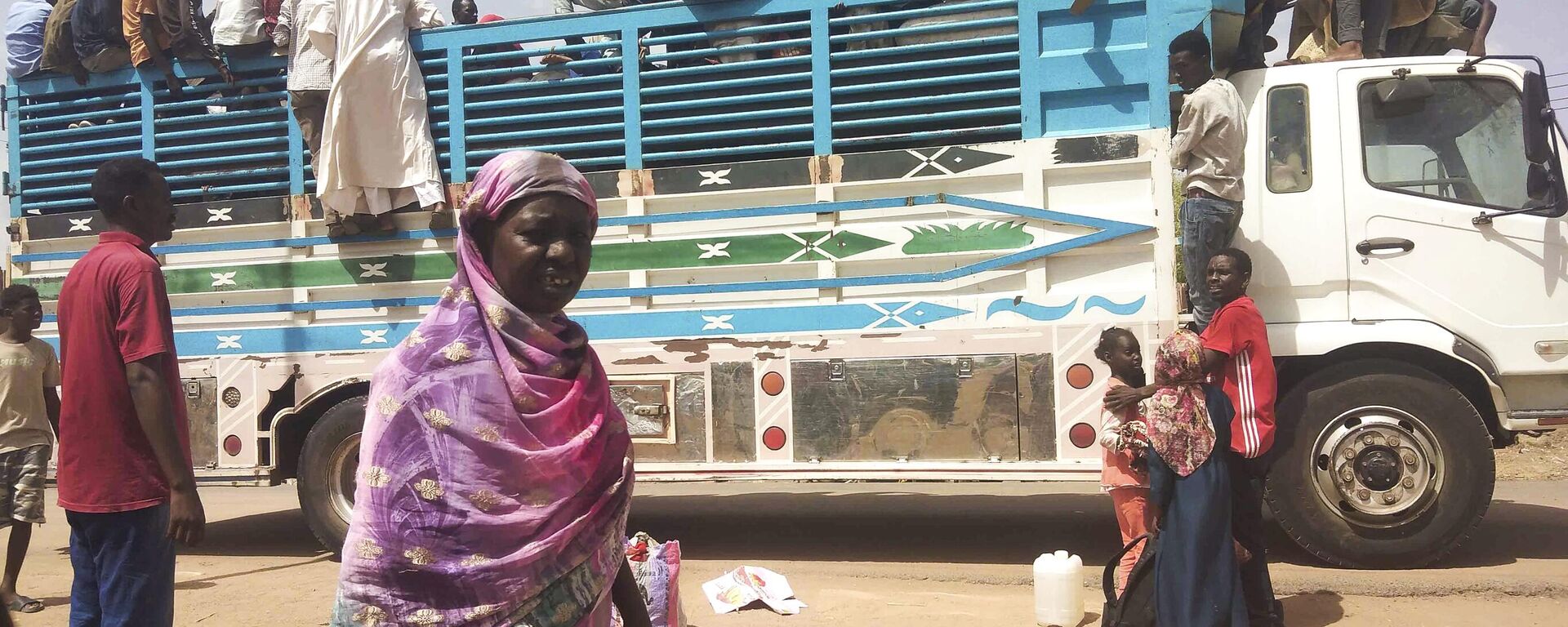https://en.sputniknews.africa/20240316/hunger-is-pervasive-unicef-warns-of-catastrophic-death-toll-in-sudan-as-famine-worsens-1065586533.html
'Hunger is Pervasive': UNICEF Warns of 'Catastrophic' Death Toll in Sudan as Famine Worsens
'Hunger is Pervasive': UNICEF Warns of 'Catastrophic' Death Toll in Sudan as Famine Worsens
Sputnik Africa
Violent confrontations between the Sudanese army and the Rapid Support Forces (RSF) erupted in April 2023. Since then, the parties have proposed several... 16.03.2024, Sputnik Africa
2024-03-16T15:01+0100
2024-03-16T15:01+0100
2024-03-16T15:24+0100
armed clashes in sudan
sudan
united nations children's fund (unicef)
conflict
south sudan
chad
united nations (un)
rapid support forces (rsf)
world food programme (wfp)
hunger
https://cdn1.img.sputniknews.africa/img/07e8/03/10/1065588969_0:161:3070:1888_1920x0_80_0_0_b811fa7c472969948a831d1eacf02267.jpg
As the conflict in Sudan exacerbates starvation, the United Nations children's Agency (UNICEF) issued a warning on Friday regarding the potential for catastrophic loss of lives in Sudan and demanded a massive mobilization of resources.She also emphasized that 24 million kids across the country need peace that cannot be achieved without a ceasefire.The official was a part of the first UN team to return to Khartoum, the country's capital, since the army and RSF started fighting there almost a year ago. According to Lawler, the 12-person crew discovered malnourished children living in hospitals that were completely dark due to inoperable generators. There are also not enough beds in the hospitals, she noted, and patients are forced to share them with one or even two other people.Lastly, Lawler outlined the three tasks:The dire situation in Sudan was also confirmed by another UN body — the World Food Programme (WFP). On Tuesday, it said that in a few weeks, food assistance for Sudanese refugees in Chad — many of whom are close to starvation — will cease unless further funding is obtained.Furthermore, the WFP warned a week ago that the ongoing conflict in Sudan poses a substantial risk of triggering the worst famine in human history. The organization added that the crisis has severely disrupted the lives of millions of people in the country.
https://en.sputniknews.africa/20240307/world-food-programme-warns-conflict-in-sudan-could-lead-to-worst-hunger-in-world-1065435832.html
sudan
south sudan
chad
central africa
north africa
Sputnik Africa
feedback@sputniknews.com
+74956456601
MIA „Rossiya Segodnya“
2024
Christina Glazkova
https://cdn1.img.sputniknews.africa/img/07e7/0b/07/1063380906_0:0:673:674_100x100_80_0_0_79628b4d0cd9f29291a57aa13bbf9e7a.jpg
Christina Glazkova
https://cdn1.img.sputniknews.africa/img/07e7/0b/07/1063380906_0:0:673:674_100x100_80_0_0_79628b4d0cd9f29291a57aa13bbf9e7a.jpg
News
en_EN
Sputnik Africa
feedback@sputniknews.com
+74956456601
MIA „Rossiya Segodnya“
Sputnik Africa
feedback@sputniknews.com
+74956456601
MIA „Rossiya Segodnya“
Christina Glazkova
https://cdn1.img.sputniknews.africa/img/07e7/0b/07/1063380906_0:0:673:674_100x100_80_0_0_79628b4d0cd9f29291a57aa13bbf9e7a.jpg
sudan, united nations children's fund (unicef), conflict, south sudan, chad, united nations (un), rapid support forces (rsf), world food programme (wfp), hunger, health, humanitarian aid , central africa, north africa
sudan, united nations children's fund (unicef), conflict, south sudan, chad, united nations (un), rapid support forces (rsf), world food programme (wfp), hunger, health, humanitarian aid , central africa, north africa
'Hunger is Pervasive': UNICEF Warns of 'Catastrophic' Death Toll in Sudan as Famine Worsens
15:01 16.03.2024 (Updated: 15:24 16.03.2024) Christina Glazkova
Writer / Editor
Violent confrontations between the Sudanese army and the Rapid Support Forces (RSF) erupted in April 2023. Since then, the parties have proposed several short-term nationwide ceasefires, but none of them have helped to resolve the conflict.
As the conflict in Sudan exacerbates starvation, the United Nations children's Agency (UNICEF)
issued a warning on Friday regarding the potential for catastrophic loss of lives in Sudan and demanded a massive mobilization of resources.
"The brutal war in Sudan is pushing the country towards a famine and unless there is sufficient political will, attention and resources put towards the response now, we are looking at a potential catastrophic loss of lives," Jill Lawler, chief of field operations and emergency for UNICEF in Sudan, said at a UN briefing in Geneva. "Hunger is pervasive – it is the number one concern people expressed."
She also emphasized that 24 million kids across the country need peace that cannot be achieved without a
ceasefire.
"Most importantly – 24 million children across Sudan need and deserve peace. They need a ceasefire. They need a lasting political solution. They need a chance to be children," Lawler stated.
The official was a part of the first UN team to return to Khartoum, the country's capital, since the army and
RSF started fighting there almost a year ago.
According to Lawler, the 12-person crew discovered malnourished children living in hospitals that were completely dark due to inoperable generators. There are also not enough beds in the hospitals, she noted, and patients are forced to share them with one or even two other people.
Lastly, Lawler outlined the three tasks:
Parties must provide timely, continuous, and unrestricted
humanitarian access across Sudan's combat lines and borders with neighboring countries. Access through
Chad and South Sudan "remains absolutely critical" for Darfur residents.
Conflict parties "have a moral imperative and legal responsibility" to protect children. They must take tangible steps to halt child killing and maiming, child recruitment and usage in the conflict, and all types of sexual assault.
By the end of March, the international community must mobilize "massive" resources to help humanitarian partners get supplies and capabilities on the ground in time to prevent a humanitarian disaster.
The dire situation in
Sudan was also confirmed by another UN body — the World Food Programme (WFP). On Tuesday, it said that in a few weeks, food assistance for Sudanese refugees in Chad — many of whom are close to starvation — will cease unless further funding is obtained.
Furthermore, the WFP warned a week ago that the ongoing conflict in Sudan poses a substantial risk of triggering the worst famine in human history. The organization added that the crisis has severely disrupted the lives of millions of people in the country.



